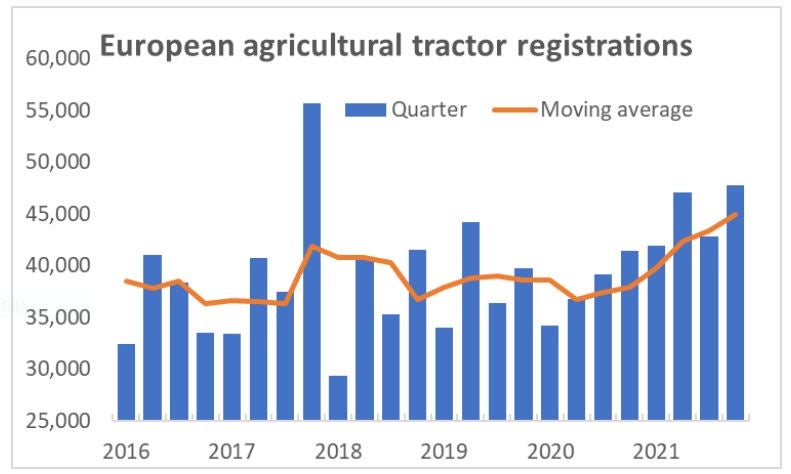
Registrations of agricultural tractors in Europe in 2021 were up 17% year-on-year, despite widespread supply chain disruption caused by the Covid-19 pandemic, new figures by the European Agricultural Machinery Association (CEMA) have shown.
Nearly 230,000 tractors were registered across Europe in the full year 2021, the highest level for nearly a decade, according to a report published by CEMA on 22 March 2022.

In the UK, the year was a story of two halves, with an increase of 25% in the number of tractor registrations in the first six months, compared with same period in 2020. However, supply issues took their toll in the second half of 2021, with registrations only marginally higher than in 2020 and 2% below average.
Overall registrations for the year were on a par with better performing recent years – but this total could have been substantially higher without the significant supply chain issues.
The CEMA report states: “It was a similar story for other types of farm equipment, with the value of orders for non-mobile machinery up 17% on 2020 but completed sales only 3% higher. The backlog of orders waiting to be delivered at the end of the year was 40% larger than a year before, having also risen at a similar rate during 2020.”
How well do you really know your competitors?
Access the most comprehensive Company Profiles on the market, powered by GlobalData. Save hours of research. Gain competitive edge.

Thank you!
Your download email will arrive shortly
Not ready to buy yet? Download a free sample
We are confident about the unique quality of our Company Profiles. However, we want you to make the most beneficial decision for your business, so we offer a free sample that you can download by submitting the below form
By GlobalDataJohn Bolton, Head of Food & Agriculture at BNP Paribas Leasing Solutions, said: “The release echoes our findings – orders for tractors and agricultural equipment remain very strong but production delays are having a significant impact on delivery times. With these issues set to continue, buyers will need to think further ahead when considering their purchasing plans.”
“In addition to order backlogs, the industry is also contending with spiralling production costs. Despite these challenging conditions, demand remains buoyant and we continue to work closely with our manufacturer, dealer and broker partners to support them in delivering proactive finance solutions which help drive the industry forward,” Bolton said.







